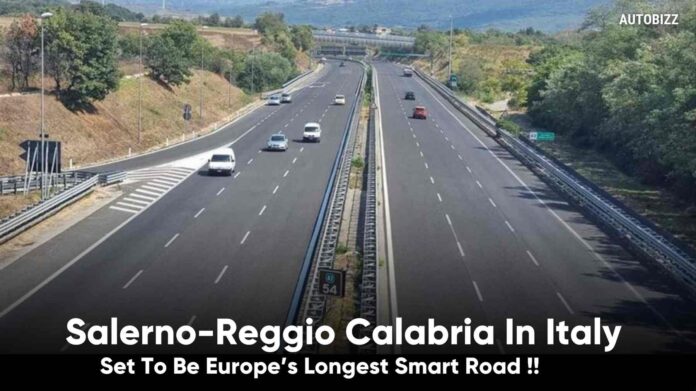This 400-kilometer stretch of highway could be a turning-point for Europe’s transportation infrastructure.
The drive to adopt ultra-high-tech infrastructure, not just for vehicles but also for roadways, has fueled innovation in a number of countries for a long time. It appears that future roads will be more than just asphalt and concrete with lines painted on them, including biodegradable materials and 5G-enabled streets. Steps are being taken throughout Europe, particularly in Italy, to alter one of the country’s longest roadways.
Because of its protracted construction time and less-than-ideal administration, the Salerno-Reggio Calabria highway is one of Italy’s most well-known roadways. With loads of technical developments in the works, the A2, also known as the Autostrada del Mediterraneo, is destined to redeem itself in the future. The approximately 400-kilometer (248.5-mile) highway between Salerno and Reggio Calabria will be the first in Europe to be designated as a “Smart Road.”
So, what exactly does a Smart Road entail? The Salerno-Reggio Calabria motorway, for example, is pursuing a three-pronged strategy that includes connectivity, autonomous driving, and sustainable energy. To begin with, the roadway infrastructure expansions will include the latest generation wireless connection. Road users will be able to connect to the roadway using a mobile application.
An multitude of smart services, the majority of which are aimed at delivering heads-up information, will be available through the app. The ultra-connected highway will be able to alert vehicles and other road users hundreds of kilometres ahead of time about risks, slowdowns, accidents, or construction sites, as well as give appropriate alternate routes.
Apart from boasting state-of-the-art connectivity features, the Smart Road infrastructure will also transform the entire 400-kilometer stretch of the Autostrada del Mediterraneo into an autonomous driving safe haven. Yes, it sounds incredibly lofty, but you will soon be able to drive through the entire highway completely hands-free, provided, of course, that your car or motorcycle has the capability to do so. If successful, the Autostrada del Mediterraneo will be the very first roadway in Europe to fully support autonomous driving capabilities.
Last but definitely not least, Autostrada del Mediterraneo seeks to be completely eco-sustainably. This means that all the electricity required to manage the highway’s new and advanced tech systems will come from renewable energy sources. The plan is that energy will be generated through photovoltaic panels, a specific type of solar panel which channels sunlight into electricity. Wind turbines are also expected to be in operation. This also means that fast-charging stations for EVs are going to be set up in multiple locations along the 400-kilometer stretch of road.
Sources: Moto.IT, TomsHW, Vesuvio Live

